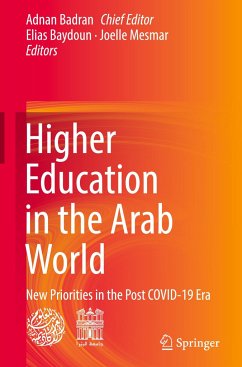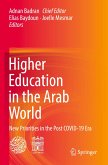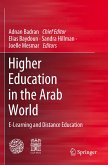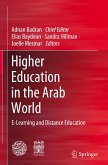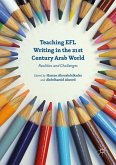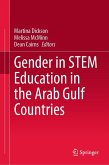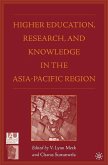Higher Education in the Arab World
New Priorities in the Post COVID-19 Era
Herausgegeben:Badran, Adnan; Baydoun, Elias; Mesmar, Joelle
Higher Education in the Arab World
New Priorities in the Post COVID-19 Era
Herausgegeben:Badran, Adnan; Baydoun, Elias; Mesmar, Joelle
- Gebundenes Buch
- Merkliste
- Auf die Merkliste
- Bewerten Bewerten
- Teilen
- Produkt teilen
- Produkterinnerung
- Produkterinnerung
This book presents selected case studies from the Arab world on the universities responses to the pandemic. This book will look in detail at the priorities of the higher education sector in the post-COVID-19 era and the changes that must be adopted by universities and governments. These changes will allow the higher education sector to emerge from the crisis and build short- and long-term resilience.
The onset of the COVID-19 pandemic has induced sudden changes worldwide by setting a global lockdown that has impacted all industries and sectors, affecting our daily lives and forcing us to…mehr
Andere Kunden interessierten sich auch für
![Higher Education in the Arab World Higher Education in the Arab World]() Higher Education in the Arab World77,99 €
Higher Education in the Arab World77,99 €![Higher Education in the Arab World Higher Education in the Arab World]() Higher Education in the Arab World123,99 €
Higher Education in the Arab World123,99 €![Higher Education in the Arab World Higher Education in the Arab World]() Higher Education in the Arab World123,99 €
Higher Education in the Arab World123,99 €![Teaching EFL Writing in the 21st Century Arab World Teaching EFL Writing in the 21st Century Arab World]() Teaching EFL Writing in the 21st Century Arab World39,99 €
Teaching EFL Writing in the 21st Century Arab World39,99 €![Gender in STEM Education in the Arab Gulf Countries Gender in STEM Education in the Arab Gulf Countries]() Gender in STEM Education in the Arab Gulf Countries108,99 €
Gender in STEM Education in the Arab Gulf Countries108,99 €![Gender in STEM Education in the Arab Gulf Countries Gender in STEM Education in the Arab Gulf Countries]() Gender in STEM Education in the Arab Gulf Countries113,99 €
Gender in STEM Education in the Arab Gulf Countries113,99 €![Higher Education, Research, and Knowledge in the Asia Pacific Region Higher Education, Research, and Knowledge in the Asia Pacific Region]() V. Lynn Meek / Charas SuwanwelaHigher Education, Research, and Knowledge in the Asia Pacific Region77,99 €
V. Lynn Meek / Charas SuwanwelaHigher Education, Research, and Knowledge in the Asia Pacific Region77,99 €-
-
-
This book presents selected case studies from the Arab world on the universities responses to the pandemic. This book will look in detail at the priorities of the higher education sector in the post-COVID-19 era and the changes that must be adopted by universities and governments. These changes will allow the higher education sector to emerge from the crisis and build short- and long-term resilience.
The onset of the COVID-19 pandemic has induced sudden changes worldwide by setting a global lockdown that has impacted all industries and sectors, affecting our daily lives and forcing us to adapt to a new normal. This book is the first major account of how the pandemic has shaken universities and higher education institutions in the Arab world today and tomorrow. Crucially, it examines the responses of universities to COVID-19, highlights their current position, and addresses the negative and positive outcomes. Has this crisis become an adversity or an opportunity forhigher education institutions? What are the pillars that will ensure the success of the Arab higher education sector post COVID-19?
The onset of the COVID-19 pandemic has induced sudden changes worldwide by setting a global lockdown that has impacted all industries and sectors, affecting our daily lives and forcing us to adapt to a new normal. This book is the first major account of how the pandemic has shaken universities and higher education institutions in the Arab world today and tomorrow. Crucially, it examines the responses of universities to COVID-19, highlights their current position, and addresses the negative and positive outcomes. Has this crisis become an adversity or an opportunity forhigher education institutions? What are the pillars that will ensure the success of the Arab higher education sector post COVID-19?
Produktdetails
- Produktdetails
- Verlag: Springer / Springer International Publishing / Springer, Berlin
- Artikelnr. des Verlages: 978-3-031-07538-4
- 1st edition 2022
- Seitenzahl: 372
- Erscheinungstermin: 30. September 2022
- Englisch
- Abmessung: 241mm x 160mm x 25mm
- Gewicht: 790g
- ISBN-13: 9783031075384
- ISBN-10: 3031075382
- Artikelnr.: 63986067
- Herstellerkennzeichnung Die Herstellerinformationen sind derzeit nicht verfügbar.
- Verlag: Springer / Springer International Publishing / Springer, Berlin
- Artikelnr. des Verlages: 978-3-031-07538-4
- 1st edition 2022
- Seitenzahl: 372
- Erscheinungstermin: 30. September 2022
- Englisch
- Abmessung: 241mm x 160mm x 25mm
- Gewicht: 790g
- ISBN-13: 9783031075384
- ISBN-10: 3031075382
- Artikelnr.: 63986067
- Herstellerkennzeichnung Die Herstellerinformationen sind derzeit nicht verfügbar.
Professor Adnan Badran the Chancellor of the University of Petra and the Chairman of the Board of Trustees of the University of Jordan. He is a biologist with over 166 papers presented, and 41 books, 54 research papers published and 4 patents. He was awarded an Honorary Doctorate from Sungkyunkwan University, Seoul (1981); an Honorary Doctorate in Science from Michigan State University, (2007); an Honorary Doctorate in Business from Yarmouk University, Jordan (2014); the West Watkins distinguished Lectureship Award (2009) USA; the Hall of Fame Alumni Award from Oklahoma State University, USA; and the Honorary Professorship from L.N. Gumilev Eurasian National University Kazakhstan (2012). Also, he was awarded the Arab Thought Foundation Award for best Arab scientist in higher education research (2005); the TWAS Regional Prize for "Building Scientific Institutions" (2009); the World Education Asia award for Outstanding Contribution to Education (2011) and the Shoman awardfor Peer review of young Arab scientists. Badran was Prime Minister (2005), Minister of Agriculture (1989) and Minister of Education (1989) in Jordan. He was Senator and Chair of the Senate Committee on Science, Education and Culture (2006-2010). He also served as Deputy Director-General of UNESCO (1994-1998) and Assistant Director General for Science, Paris (1990-1994). Founding President of Yarmouk University and Jordan University of Science and Technology (1976-1986), President of Philadelphia University (1998-2005) and President of University of Petra (2007-2014), and Dean of the Faculty of Sciences at the University of Jordan (1971-1976). Secretary General (1986-1987) and Vice-president (2014- ) of the Higher Council for Science and Technology, Jordan. President of the National Centre of Human Rights, Jordan (2008-2011) and President of the Asia-Pacific Forum on Human Rights, Sidney (2009-2011). Member of the Board of Trustees of the Arab Thought Forum (2012- ). He isa Fellow and former Vice-president of the Academy of Sciences for the Developing World (TWAS), Fellow of the Islamic World Academy of Sciences (IAS) and President of the Arab Academy of Sciences. Chairman of the Board of the Arab Forum for Environment and Development in Beirut (2008- ). President of the Higher Council of the National Centre for Curriculum development (2017-2019) and Chairman of Shoman Trust Fund for Research (2019- ). Member of the Board of Trustees of the King Abdullah Ibn Al Hussein Award for Innovation (2020-). Badran received his B.Sc from Oklahoma State University (1959), and Master then PhD from Michigan State University (1963), USA. Professor Elias Baydoun was educated at the University of Jordan, Amman (BS 1971), the American University of Beirut (AUB; MS 1977), and the University of Cambridge where he obtained his MPhil in 1978 and PhD in 1980. He is currently Professor of Biology at AUB, Secretary General of the Arab Academy of Sciences and Adjunct Professor at the University of Petra in Jordan. Previous positions included: Chairman of Biology (1978-93) and Associate Professor at AUB; Associate Professor, Assistant President (1983-86), Director of Planning and Development (1985-1986), and Director of Personnel (1985-1986) at Yarmouk University, Jordan. His awards include: Federation of Arab Scientific Research Councils Award, Abdul Hamid Shoman Prize for Young Arab Scientists for Biology, AUB Research Award in Natural Sciences (twice), Distinguished Scholar Award of the Arab Fund for Economic and Social Development, Developing World Study Award of the Royal Society UK and TWAS-ARO Regional Prize for Public Understanding and Popularization of Science. He is Fellow of several learned societies including the Institute of Biology, London, TWAS, Islamic World Academy of Sciences and the Arab Academy of Sciences. He organized and chaired 23 international conferences on topics related to the development ofthe Arab Middle East Region. His research interests include membrane and carbohydrate biology, biotransformation, nanotechnology, and medicinal plants. Professor Baydoun supervised and served on the committees of 60 PhD and MS students. He has published over 120 articles in international refereed journals and over 120 abstracts and papers in the proceedings of international conferences, as well as authoring several biology textbooks for secondary schools and community colleges. He is the first inventor of a patent on treatment of protozoal diseases (US Patent 9,173,888). He translated into Arabic a university textbook in biochemistry and was the General Coordinator of the four volumes of the Arabic Encyclopedia on Knowledge for Sustainable Development published by UNESCO. He is the editor of six books published by Springer; one on "Water, Energy and Food Sustainability in the Middle East - The Sustainability Triangle" and five on Higher Education in the Arab World. He is a member of the Editorial Board of Scientific Reports, a journal from Nature Publishing Group and other journals. He served as consultant for several local, regional, and international organizations including UNESCO and UNEP. Dr. Joelle Mesmar is a Research Associate at the American University of Beirut, Lebanon, working on the investigation of the role of plant extracts in the treatment of cancer using tissue culture techniques and nanotechnology. Previously, Joelle worked at the Office of the First Lady in Syria and was responsible in overseeing and facilitating the affairs of the Board of Trustees of the Syria Trust for Development by providing advice on governance principles and practices and supporting the work of the Board Committees as required in areas related to strategic planning. She graduated from the American University of Beirut, Lebanon with a degree in Biology (BS 2004) and obtained her PhD in plant biochemistry and molecular biology from the University of Glasgow,UK in 2009.
The Post-COVID Classroom: Lessons from a Pandemic.- How to Prevent a Crisis Becoming a Catastrophe, COVID and Universities.- Do Disruptive Events Favor the Bold or the Old?.- Embracing Different Modes of Learning.- Bridging Academia with Industry and Society.- Shaping the Future: North African Universities after COVID-19.- E-Learning Quality Requirements for Post COVID-19 Era in the Arab World.- Reconceptualizing Business Education: An Innovative Curriculum Approach.- Higher Education in Syria Post War and Pandemic: Challenges and Opportunities.- Flagship Project for Accelerating R&D on COVID-19 in Kuwait.- Effective Partnerships with Multinational Companies.- Leveraging Research and Innovation as Key Tools for a Post-COVID Era: Lessons Learned and Future Plans Moving Forward Towards Resilient Economic Reconstruction.- Opportunities in Disruption: Higher Education Post the COVID-19 Era.- Investing in Infrastructure and Digital Resources.- A Post-Pandemic Strategy for Sustainability ofa Changing Higher Education Paradigm.- Revisiting Existing Financial Models.- Oral Histories of Teaching During the Pandemic.
The Post-COVID Classroom: Lessons from a Pandemic.- How to Prevent a Crisis Becoming a Catastrophe, COVID and Universities.- Do Disruptive Events Favor the Bold or the Old?.- Embracing Different Modes of Learning.- Bridging Academia with Industry and Society.- Shaping the Future: North African Universities after COVID-19.- E-Learning Quality Requirements for Post COVID-19 Era in the Arab World.- Reconceptualizing Business Education: An Innovative Curriculum Approach.- Higher Education in Syria Post War and Pandemic: Challenges and Opportunities.- Flagship Project for Accelerating R&D on COVID-19 in Kuwait.- Effective Partnerships with Multinational Companies.- Leveraging Research and Innovation as Key Tools for a Post-COVID Era: Lessons Learned and Future Plans Moving Forward Towards Resilient Economic Reconstruction.- Opportunities in Disruption: Higher Education Post the COVID-19 Era.- Investing in Infrastructure and Digital Resources.- A Post-Pandemic Strategy for Sustainability ofa Changing Higher Education Paradigm.- Revisiting Existing Financial Models.- Oral Histories of Teaching During the Pandemic.

